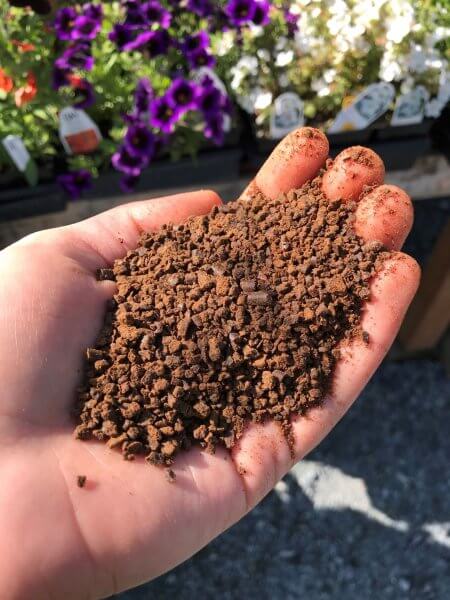
A handful of the Neem Cake Fertilizer we’re currently selling at the shop.
Here at Walt’s Organic Garden Center, our first response to aphids, spider mites, and powdery mildew is always to grab the spray bottle of diluted neem oil to control the pests. However, we recently started carrying neem cake, which is the byproduct when creating neem oil. The oil is produced by pressing the seed of the neem tree to extract the oils within and the remaining organic matter is known as neem cake, which acts as a wonderful soil amendment in and of itself.
There are numerous benefits to using neem cake as a soil amendment. It enriches the soil overall, provides a healthy supply of trace minerals, and slowly adds beneficial micro-nutrients over time, meaning that you can fertilize less often when using neem cake. Another added benefit that comes over time is a reduction in alkalinity in the soil because, while the neem cake is decomposing, it releases acids into the soil. If you need any more convincing, neem cake used as a soil amendment can also help to protect your plants from bad nematodes! These harmful pests, commonly known as roundworms, love to hang out in the soil and munch on the roots, foliage, and stems of plants.
Neem cake helps prevent against pests by working differently than traditional pesticides. Chemical pesticides kill and deter pests by attacking their nervous system. This can create a problem because, after long exposure to these pesticides, a pest can actually evolve to be immune to the attacks on its immune system. However, neem acts on the hormonal system of the pests to deter them, rather than the nervous system. Because of this, continued exposure to neem will not create immunity in the aphids you are discouraging from nibbling on your beloved rose plant.
When researching neem cake as a soil amendment, we found that a question arose in relation to our beloved mason bee. We know that using neem oil in a diluted form sprayed directly on plant foliage can cause harm to pollinators visiting the plant during the spray or soon after. So the question is this: if we work the neem cake into the soil, which mason bees will then collect to protect their eggs, can it harm them or their reproductive cycles? After doing extensive research on the question, we were not able to find any evidence of this occurring. However, there was very little information regarding neem cake in the soil and its effect on mason bees at all. Hence, due to that lack of information, it is hard to state with certainty that it has no effects on mason bees and their reproductive cycle.
Because neem cake is a new addition to our soil amendments, we don’t have too much experience using it on our plants in the nursery or on our landscape customers’ plants. Let us know in the comments below if you have any experience using the neem cake as a fertilizer for your soil. Better yet, stop by our retail store today to share your experience or pick up some neem cake to use in your garden.
Happy gardening and may your soil be healthy!
Sources used for this post:
https://www.whygoodnature.com/blog/neem-cake-for-gardening
h ttps://gardening-abc.com/neem-cake-gardening/
https://garden.lovetoknow.com/wiki/How_do_Pesticides_Kill_Bugs

Thank you for letting us know the benefits of using neem cake as a soil amendment. Visit us for Natural Organic Fertilizers: http://www.organicfertilizerusa.com/